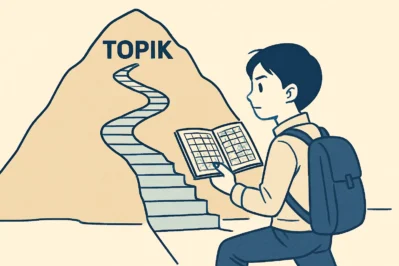Conquer Big Projects in Korean: Your Step-by-Step Guide!
Hello! Welcome to [Maeil Hangul], here to upgrade your Korean skills! 😊
Do you ever feel overwhelmed by a big goal? Maybe it’s mastering a new TOPIK level, planning your dream trip to Seoul, or even just finishing a long K-drama! Whatever your mountain is, today we’re going to learn the essential Korean phrases to break it down into small, manageable steps.
Lately in Korea, there’s a huge trend called ‘갓생’ (God-saeng), which means living a productive and exemplary life. Young people love sharing their daily plans and progress on social media. A key part of living a ‘갓생’ life is knowing how to tackle big projects without getting stressed. So, let’s learn how to do it in Korean!
Core Expressions for Project Masters
Here are three key expressions that will help you plan and conquer any goal.
1. 시작이 반이다 (Sijagi banida)
- Pronunciation [Romanization]: Si-ja-gi ba-ni-da
- English Meaning: Starting is half the battle. / A good start is half the work.
- Detailed Explanation: This is a very famous and beloved Korean proverb. You use it to encourage someone (or yourself!) who is hesitating to start a big, intimidating task. It means that the most difficult part is simply taking that first step. Once you’ve started, you’re already halfway to the finish line! It’s a wonderfully motivating phrase to use with friends.
-
💡 Pronunciation Tip:
Notice how 시작이 is pronounced [sijagi], not [sijak-i]. In Korean, when a syllable ends in a consonant (like ‘작’) and the next syllable starts with a vowel (like ‘이’), the consonant sound “moves over” to the next syllable. This rule is called ‘연음 (yeoneum)’ or linking, and it makes your pronunciation sound much smoother and more natural!
2. 차근차근 (Chageun-chageun)
- Pronunciation [Romanization]: Cha-geun-cha-geun
- English Meaning: Step by step; in a calm and orderly manner.
-
Detailed Explanation: This adverb is your best friend when you have a lot to do. It describes the action of doing something methodically, one step at a time, without rushing. You can use it with verbs like 하다 (hada – to do) or 배우다 (baeuda – to learn). For example, “한국어를 차근차근 배우고 있어요” means “I am learning Korean step by step.”
-
💡 Pronunciation Tip:
The first syllable ‘차 (cha)’ is an aspirated sound. This means you should release a strong puff of air, like the ‘ch’ in “chart.” In contrast, the ‘ㄱ (g)’ in ‘근 (geun)’ is unaspirated, so it’s a softer sound, like the ‘g’ in “go.” Differentiating these sounds will make you sound more like a native speaker!
3. 계획을 세우다 (Gyehoegeul seuda)
- Pronunciation [Romanization]: Gye-hoe-geul se-u-da
- English Meaning: To make a plan / To set up a plan.
-
Detailed Explanation: This is the go-to phrase for planning. ‘계획’ (gyehoek) means “plan,” and ‘세우다’ (seuda) literally means “to set up” or “to establish.” Before you start any project, it’s always a good idea to 계획을 세우다 first.
-
💡 Pronunciation Tip:
Let’s look at 계획을 pronounced as [gyehoegeul]. Just like our first tip, the linking rule ‘연음 (yeoneum)’ is at play here! The final ‘ㄱ (k)’ sound of ‘계획’ moves over to the ‘을’ particle, making the pronunciation smooth. Instead of a hard stop (Gyehoek. Eul.), it flows beautifully ([Gye-hoe-geul]).
Example Dialogue
Let’s see how these expressions work in a real conversation. Imagine two friends, A and B, talking about studying for the big TOPIK exam.
A: 아, 토픽 시험 공부해야 하는데… 뭐부터 해야 할지 모르겠어. 너무 많아.
(A, topik siheom gongbuhaeya haneunde… mwo-buteo haeya halji moreugesseo. Neomu mana.)
(Ah, I have to study for the TOPIK exam… I don’t know where to start. There’s so much.)
B: 걱정 마! 시작이 반이다. 우리 먼저 계획을 세우자.
(Geokjeong ma! Sijagi banida. Uri meonjeo gyehoegeul seuja.)
(Don’t worry! Starting is half the battle. First, let’s make a plan.)
A: 계획? 좋아.
(Gyehoek? Joa.)
(A plan? Okay.)
B: 응. 매일 차근차근 공부하면 돼. 오늘은 단어부터 시작할까?
(Eung. Maeil chageun-chageun gongbuhamyeon dwae. Oneureun daneo-buteo sijakalkka?)
(Yeah. We just have to study step by step every day. How about we start with vocabulary today?)
A: 와, 훨씬 마음이 편하다! 고마워!
(Wa, hwolssin maeumi pyeonhada! Gomawo!)
(Wow, I feel so much better! Thanks!)
Culture Tip & Trend Deep Dive 📈
As we mentioned, the ‘갓생’ (God-saeng) trend is all about productivity and self-improvement. On Instagram, you’ll see countless posts with hashtags like #갓생챌린지 (God-saeng Challenge) or #공스타그램 (gong-stagram, a mix of ‘study’ and ‘Instagram’). People share photos of their neatly written planners (계획을 세우다 in action!) and time-lapse videos of themselves studying (차근차근 achieving their goals).
Even K-pop idols often talk about their comeback preparations this way. They’ll mention how they made a detailed plan with their team and practiced the choreography step-by-step. So, when you use these phrases to talk about your own Korean learning journey, you’re not just speaking correctly—you’re speaking in a way that’s modern, relatable, and totally in sync with Korean culture!
Let’s Review & Practice!
Great job today! We learned three powerful phrases to help you conquer your goals:
* 시작이 반이다 (Encouragement to start)
* 차근차근 (To do things step by step)
* 계획을 세우다 (To make a plan)
Now, it’s your turn to try!
1. Fill in the blank:
Your friend wants to learn how to cook Korean food but is scared of all the recipes. How do you encourage them?
“요리하는 거 어렵지 않아! (Yorihaneun geo eoryeopji ana! / Cooking isn’t hard!) _______!”
2. Make a sentence:
Using the words below, how would you say, “I am going to make a travel plan for Korea”?
(한국 / 여행 / 계획을 세우다) -> _____________________.
What’s a big project YOU are working on? Leave a comment below using the expressions we learned today! We’re cheering for you! 파이팅! (Fighting!)






